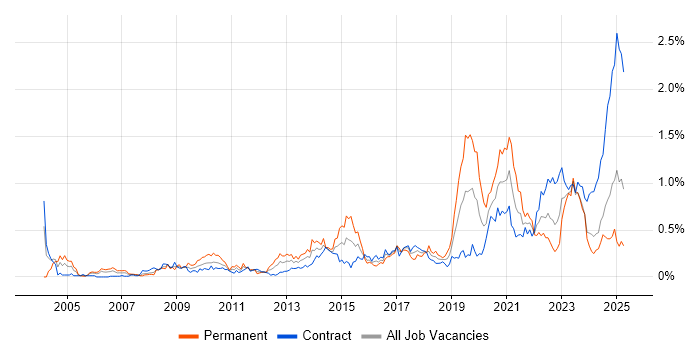Data Security
UK > Scotland
The table below provides summary statistics for permanent job vacancies advertised in Scotland requiring Data Security skills. It includes a benchmarking guide to the annual salaries offered in vacancies that cited Data Security over the 6 months leading up to 5 May 2025, comparing them to the same period in the previous two years.
| 6 months to 5 May 2025 |
Same period 2024 | Same period 2023 | |
|---|---|---|---|
| Rank | 141 | 267 | 205 |
| Rank change year-on-year | +126 | -62 | +14 |
| Permanent jobs citing Data Security | 8 | 16 | 14 |
| As % of all permanent jobs advertised in Scotland | 0.28% | 0.24% | 0.30% |
| As % of the Processes & Methodologies category | 0.30% | 0.26% | 0.32% |
| Number of salaries quoted | 7 | 14 | 13 |
| 10th Percentile | £45,500 | £27,500 | £31,900 |
| 25th Percentile | £48,125 | £29,563 | £37,500 |
| Median annual salary (50th Percentile) | £57,500 | £43,250 | £47,500 |
| Median % change year-on-year | +32.95% | -8.95% | -2.11% |
| 75th Percentile | £88,750 | £77,500 | £62,833 |
| 90th Percentile | £100,000 | £82,750 | - |
| UK median annual salary | £65,000 | £65,000 | £57,500 |
| % change year-on-year | - | +13.04% | - |
All Process and Methodology Skills
Scotland
Data Security falls under the Processes and Methodologies category. For comparison with the information above, the following table provides summary statistics for all permanent job vacancies requiring process or methodology skills in Scotland.
| Permanent vacancies with a requirement for process or methodology skills | 2,637 | 6,250 | 4,441 |
| As % of all permanent jobs advertised in Scotland | 92.24% | 92.80% | 94.25% |
| Number of salaries quoted | 1,346 | 2,418 | 2,230 |
| 10th Percentile | £31,250 | £28,750 | £32,499 |
| 25th Percentile | £44,000 | £40,500 | £42,000 |
| Median annual salary (50th Percentile) | £55,000 | £52,500 | £57,500 |
| Median % change year-on-year | +4.76% | -8.70% | +9.52% |
| 75th Percentile | £63,750 | £65,000 | £73,750 |
| 90th Percentile | £83,369 | £80,000 | £85,000 |
| UK median annual salary | £57,500 | £55,000 | £61,500 |
| % change year-on-year | +4.55% | -10.57% | +2.50% |
Data Security
Job Vacancy Trend in Scotland
Job postings citing Data Security as a proportion of all IT jobs advertised in Scotland.

Data Security
Salary Trend in Scotland
3-month moving average salary quoted in jobs citing Data Security in Scotland.
Data Security
Salary Histogram in Scotland
Salary distribution for jobs citing Data Security in Scotland over the 6 months to 5 May 2025.
Data Security
Job Locations in Scotland
The table below looks at the demand and provides a guide to the median salaries quoted in IT jobs citing Data Security within the Scotland region over the 6 months to 5 May 2025. The 'Rank Change' column provides an indication of the change in demand within each location based on the same 6 month period last year.
| Location | Rank Change on Same Period Last Year |
Matching Permanent IT Job Ads |
Median Salary Past 6 Months |
Median Salary % Change on Same Period Last Year |
Live Jobs |
|---|---|---|---|---|---|
| Edinburgh | +17 | 5 | £78,750 | +115.75% | 10 |
| Glasgow | +171 | 1 | £52,500 | -30.00% | 1 |
| Stirling | - | 1 | £75,000 | - | 2 |
| Falkirk | - | 1 | £75,000 | - | |
| Data Security UK |
|||||
Data Security
Co-occurring Skills and Capabilities in Scotland by Category
The follow tables expand on the table above by listing co-occurrences grouped by category. The same employment type, locality and period is covered with up to 20 co-occurrences shown in each of the following categories:
